A PLUME BOOK
YOUR BRAIN IS (ALMOST) PERFECT
DR. READ MONTAGUE is a professor in the department of neuroscience at the Baylor College of Medicine, director of the Human Neuroimaging Lab, and director of the Center for Theoretical Neuroscience. He has been a fellow at the Institute for Advanced Study in Princeton, New Jersey. His research focuses on computational neurosciencethe connection between the physical mechanisms present in real neural tissue and the computational functions that these mechanisms embody.
Praise for Your Brain Is (Almost) Perfect
A fascinating introduction to an important new area of research in the science of mind.
Steven Pinker, Johnstone Family Professor, Psychology Department, Harvard University, and author of The Blank Slate and How the Mind Works
Montague knows that cool reason is not enough to explain decisions: Emotions provide biological value and are an indispensable factor in how one chooses. Drawing on a vast amount of recent knowledge, some of which [is] coming from his own work, Montague makes a compelling case for the significance of that fact in everyday choices. Read this book and maybe you will discover why you buy what you buy.
Antonio Damasio, Director, Brain and Creativity Institute, University of Southern California, and author of Descartes Error
Choosing is as basic a business as breathing. But how do brains make good choices and avoid stupid ones? A gifted neuroscientist, Read Montague, has spent the last decade plumbing these mysteries. Assembling a vast range of experimental results, he has now crafted a simple and coherent framework that demystifies choosing. Importantly, the approach hogties old philosophical dogmas, and invites us to look at ourselves anew, from the brains point of view. The book is comprehensively informed, calmly unafraid, and heartwarmingly witty. It tells a gripping story about what makes me, me.
Patricia Churchland, Chair, Philosophy Department, University of California, San Diego, and MacArthur genius award winner
The question of how we make choices is one of the oldest in philosophy. Read Montague, a pioneer in this field, has for the first time tackled the problem from a neuroscientific perspective that not only makes it a valuable antidote to philosophy, but is fun to read as well.
V. S. Ramachandran, M.D., Ph.D., Professor and Director, University of California, San Diego, Center for Brain and Cognition, and author of The Man with the Phantom Twin
This book covers, and connects, insights from computer science, physics, evolutionary psychology and biology, psychology, economics, and of course neuroscience. In addition to the particular insights from the different fields, the connections Montague draws between them help us understand what the brain attempts to achieve and how it goes about doing so (taking us with him). The last part of the book describes in more detail a few amazing fMRI experiments, what was learned from them, and their larger implications... Defiantly a fascinating window into this new domain of science.
Dan Ariely, Alfred P. Sloan Professor of Behavioral Economics, Massachusetts Institute of Technology
Montague deftly marries psychology and neuroscience... [and] adds new ideas to our understanding of how our brains compute.
Publishers Weekly
Provocative and accessible... the book spans several seldom-bridged worlds, from neuroscience to psychiatry, economics and social psychology, and does so with wit, precision, and elegance.
Nature
PLUME
Published by Penguin Group
Penguin Group (USA) Inc., 375 Hudson Street, New York, New York 10014, U.S.A. Penguin Group (Canada), 90 Eglinton Avenue East, Suite 700, Toronto, Ontario, Canada M4P 2Y3 (a division of Pearson Penguin Canada Inc.) Penguin Books Ltd., 80 Strand, London WC2R 0RL, England Penguin Ireland, 25 St. Stephens Green, Dublin 2, Ireland (a division of Penguin Books Ltd.) Penguin Group (Australia), 250 Camberwell Road, Camberwell, Victoria 3124, Australia (a division of Pearson Australia Group Pty. Ltd.) Penguin Books India Pvt. Ltd., 11 Community Centre, Panchsheel Park, New Delhi 110 017, India Penguin Group (NZ), 67 Apollo Drive, Rosedale, North Shore 0745, Auckland, New Zealand (a division of Pearson New Zealand Ltd.) Penguin Books (South Africa) (Pty.) Ltd., 24 Sturdee Avenue, Rosebank, Johannesburg 2196, South Africa
Penguin Books Ltd., Registered Offices: 80 Strand, London WC2R 0RL, England
Published by Plume, a member of Penguin Group (USA) Inc. Previously published in a Dutton edition under the title Why Choose This Book?
Copyright Read Montague, 2006
All rights reserved
 REGISTERED TRADEMARKMARCA REGISTRADA
REGISTERED TRADEMARKMARCA REGISTRADA
The Library of Congress has catalogued the Dutton edition as follows:
Montague, Read.
Why choose this book? : how we make decisions / Read Montague.
p. cm.
Includes bibliographical references and index.
ISBN: 978-1-101-66561-9
1. Choice (Psychology) 2. Decision making. I. Title.
BF611.M65 2006
153.83dc22
2006019015
Original hardcover design by Katy Riegel
Without limiting the rights under copyright reserved above, no part of this publication may be reproduced, stored in or introduced into a retrieval system, or transmitted, in any form, or by any means (electronic, mechanical, photocopying, recording, or otherwise), without the prior written permission of both the copyright owner and the above publisher of this book.
PUBLISHERS NOTE
The scanning, uploading, and distribution of this book via the Internet or via any other means without the permission of the publisher is illegal and punishable by law. Please purchase only authorized electronic editions, and do not participate in or encourage electronic piracy of copyrighted materials. Your support of the authors rights is appreciated.
BOOKS ARE AVAILABLE AT QUANTITY DISCOUNTS WHEN USED TO PROMOTE PRODUCTS OR SERVICES. FOR INFORMATION PLEASE WRITE TO PREMIUM MARKETING DIVISION, PENGUIN GROUP (USA) INC., 375 HUDSON STREET, NEW YORK, NEW YORK 10014.
Version_1
Introduction
WHY DID HE DO THAT?

W HY DID YOU CHOOSE this book? Maybe your choice felt driven by the cover design or a review or something more substantial like a past experience that changed your life. Perhaps the decision felt sort of random, without any clear intent one way or another. Nevertheless, you did choose, and choice means loss. For just a moment, you lost the chance to view other nearby books and instead opened this one. Your time and energy is limited and so your choice consumed precious resources. And as small as this particular investment may be, understanding your choice is important because your life is literally a compilation of billions of similar choice moments where one outcome is selected and others forgone. Who or what makes these choices? Why are some choices automatic and thoughtless while others feel like they are expressions of our free will? These questions strike at the very heart of what it means to be a thinking, feeling human, and yet our sheer familiarity with making choices hides their true nature from us. Choices are not magic, descending from some immaterial place like cost-free manna. Our brains and the experiences they harbor generate our choices, and this is why brain disease and injury can radically change the way we choose and consequently change who we are.

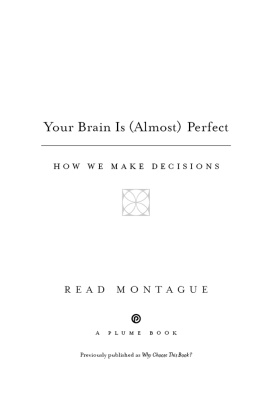
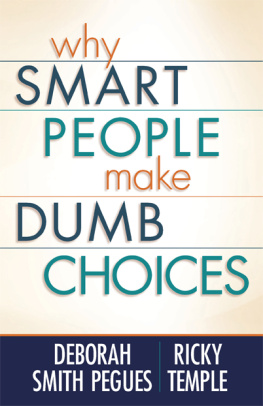
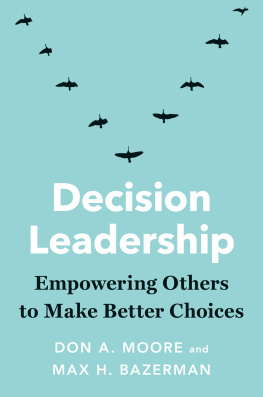

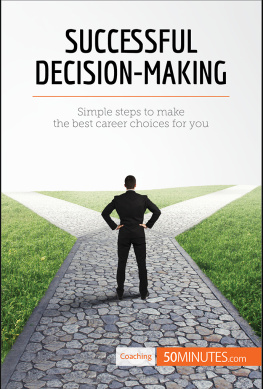
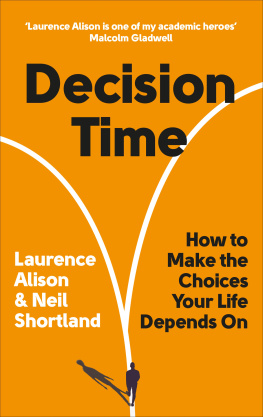
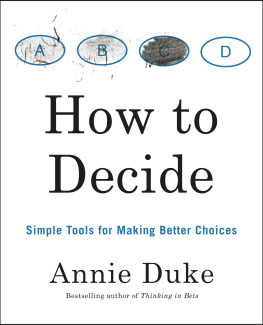

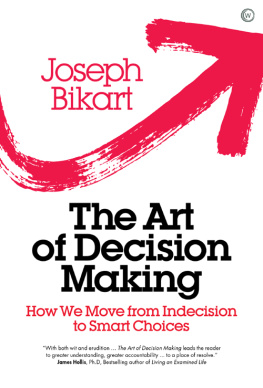
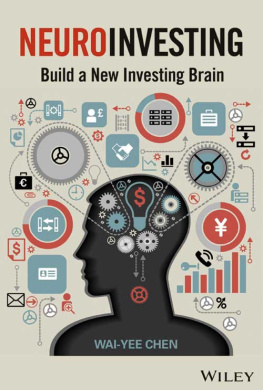
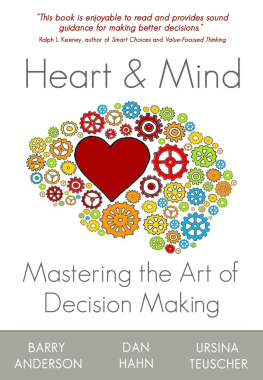


 REGISTERED TRADEMARKMARCA REGISTRADA
REGISTERED TRADEMARKMARCA REGISTRADA